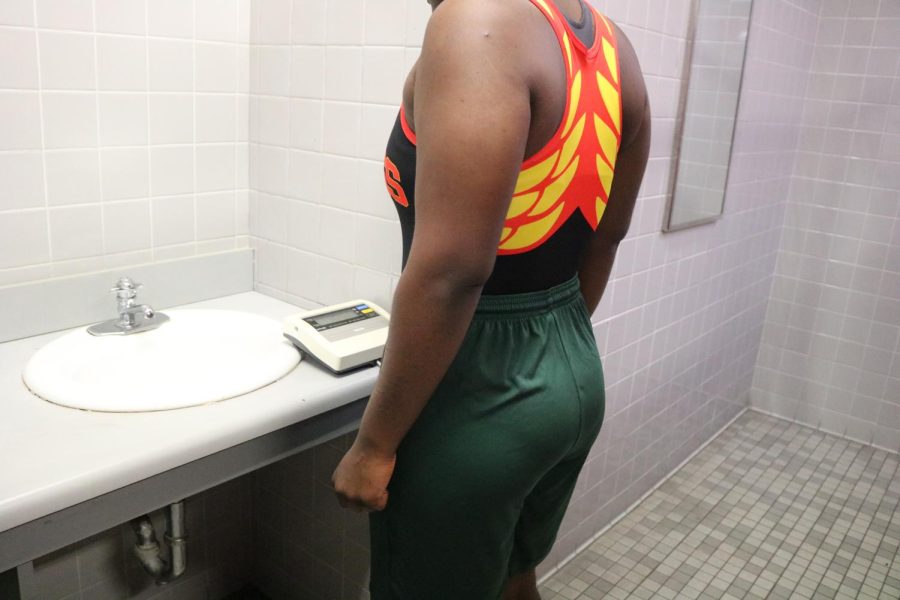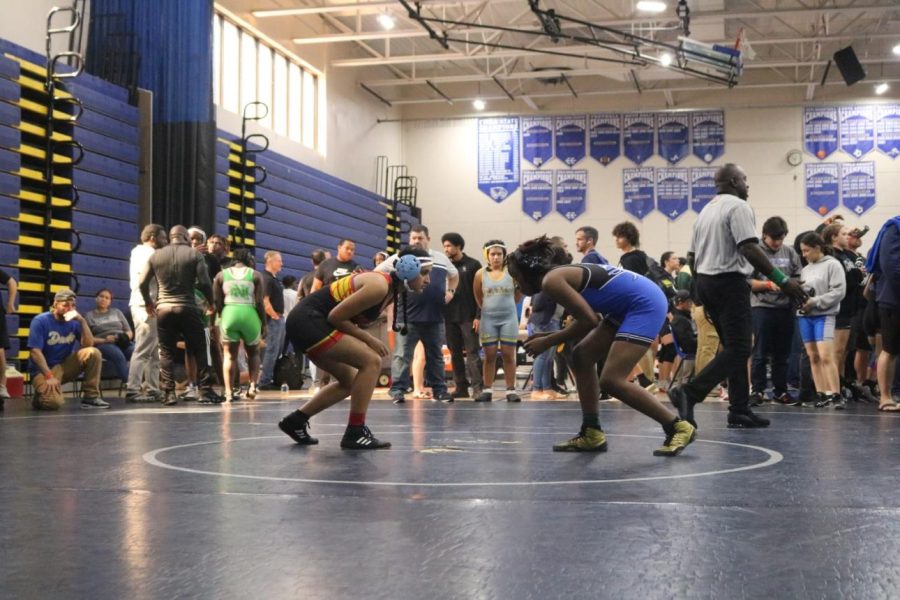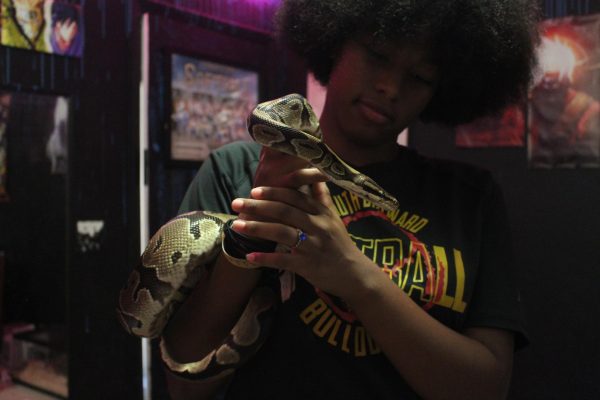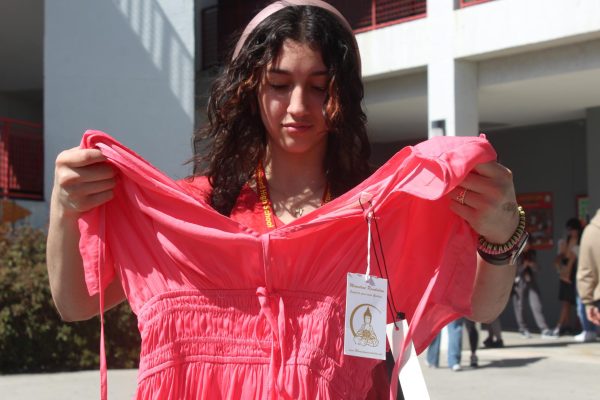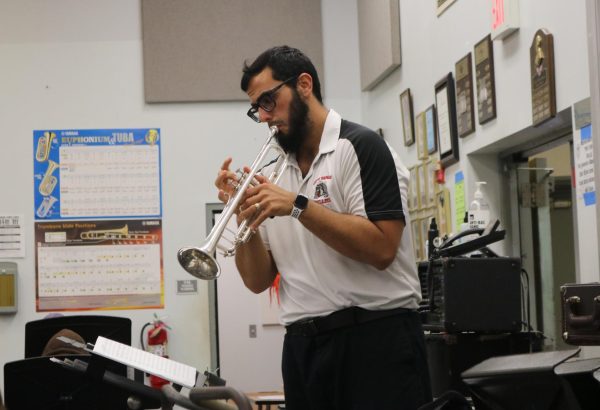SBHS Female Wrestlers “Weigh in” on Eating Disorders
SBHS wrestler Latoya Sylvestre checking to make sure she made weight before weigh-ins.
May 23, 2023
When people are trying to lose weight, there are several tried-and-true methods: reducing portion size, cutting out sweets and carbs, and upping their amount of exercise. But, SBHS freshman wrestler Mi’kyla Thompson uses a different method. Some might call it a dangerous method. She starves herself.
“I just don’t eat, like at all, all day. Like I just don’t. I starve myself,” said Thompson.
Thompson is one of 10 female wrestlers on the SBHS wrestling team and she and her teammates are obsessed with their weight. Why? Because in wrestling, your weight dictates whether or not you’re able to get on the mat. The body weight of wrestlers is strict because when players are matched, it is important that the game is fair.
“If I were to wrestle someone that weighs more than me it would be unfair, they could just like, use their weight against me,” she said.
That’s why wrestlers focus so much on being the perfect weight, and therefore how much or how little they eat, which can transfer into an obsession with eating– or not.
Thompson usually eats three meals a day, but if she gains more than her 120 lbs wrestling weight class, she starts portioning her food. If that doesn’t keep her weight down, she solves the issue by not eating at all.
“I wouldn’t eat all day and I would just forget, and it became a habit,” said Thompson. “Then, it became regular. I can just go all day without eating.”
According to the National Eating Disorders Association, studies show that in weight class sports, such as wrestling, or aesthetic sports such as gymnastics, 62% of females experience eating disorders and 33% of males do.
Thompson believes that most girls in wrestling struggle with an eating disorder because there is so much focus on being the right weight
“Focusing so much on your weight in wrestling, I feel like it definitely leads people into an eating disorder,” said Thompson.
SBHS freshman wrestler Latoya Sylvestre disagrees. She says restricting food is not encouraged by coaches and trainers. She thinks food restriction is not an issue in the sport.
“Coach encourages us to not starve ourselves, but some people do it anyway,” said Sylvestre.
SBHS wrestling Coach Major Threlkeld has been coaching the wrestling teams for three years and says that the sport of wrestling brings out the best in kids because it requires discipline, strength, and sacrifice. According to Major, there used to be no rules when it came to weight loss. Now, there are 14 weight classes in girls wrestling and they go by 5 lbs. Coach Major believes that weight classes are necessary in order for the matches to be fair.
“I think it’s perfect, that way everyone has a fair chance to win because they’re wrestling against someone their own size,” said Threlkeld.
Additionally, wrestlers can only lose one and a half percent of their body weight per week and cannot go below 12 percent of body fat for girls and 7 percent for boys.
“I don’t think it can cause an eating disorder because I cut weight myself in high school, so I have personal experience,” Threlkeld said. “Sometimes it’s more challenging to make the weight than it is to actually wrestle the match.
On top of that, Major talks to the wrestlers about cutting weight in the beginning of the season and makes sure everyone cuts weight properly.
“They need to do it properly, not wait to do it ‘till the last second before the match, because if they try to lose their weight just before the match, they’re gonna be tired and not perform as good as they would if they were dieting properly,” Threlkeld said.
He does not encourage students to starve themselves or participate in any unhealthy ways of cutting weight. Threlkeld believes that if wrestlers follow the mandatory guidelines, wrestling promotes healthy eating habits.
“That’s part of the sacrifice, if you want to be a good wrestler at a specific weight, you have to cut out junk food, excessive food, and you have to eat very strict and healthy,” said Threlkeld.
Sylvestre says her eating habits are healthy and that she’s never struggled with an eating disorder. She does, however, only eat one meal a day, restricting her food intake to 1,000 calories a day and one meal a day. She mostly eats protein and salads. She says she doesn’t really need to diet that much because her weight class is 190 lbs, which is high. Sylvestre says focusing on her weight doesn’t affect her relationship with food because she doesn’t focus on not being able to eat the foods she wants to eat. She usually weighs in at 180-185 lbs.
“Wrestling is more of a mindset thing,” said Sylvestre. “There isn’t a danger of developing an eating disorder.”
But, Allie Weiser, a licensed psychologist for five years, has a different opinion. She says certain sports, such as wrestling, have a higher risk of eating disorders. She said it could also be a way of covering up a bad relationship with food.
“Any sport that has a focus on weight and shape can make the increase for an eating disorder higher,” said Weiser.
She says that the pressure to remain a certain weight can lead someone to under-eat, not eat enough for their body to be healthy or cause them to have many thoughts and obsessions about food and weight.
“Anytime there’s restriction of food, that can make any eating disorder thoughts stronger and can take up all of their thinking, which can make them have less concentration,” said Weiser.
According to Weiser, feeling shame or feeling guilt for gaining weight could be something that makes people develop an unhealthy relationship with food, especially if someone experiences negative comments from friends, family, or their coaches. It’s particularly dangerous for wrestlers because of their personality types.
“I think the sport really sets those people up to stay in that unhealthy way of thinking, but if coaches educated wrestlers on the dangers of the rigidity and of that kind of mindset, then that could be helpful for those people,” said Weiser.
Weiser believes the focus on a certain weight could be a slippery slope into an eating disorder. She said instead of having people cut down to a specific weight, perhaps they could have people wrestle at their healthy weight or make it a wider range of weight and not a specific weight. Weiser suggests that wrestlers who have to be a certain weight or struggle with an eating disorder should work with a dietitian so they can develop a better relationship with food and to make sure they are getting all of the nutrients they need.
“Just working with a therapist, to talk about any of those food thoughts that come up, obsessions come up,” said Weiser.
Like Sylvestre, SBHS sophomore wrestler Nicole Arroyo also maintains her weight in wrestling by eating one meal a day. If she’s not worried about gaining weight, she’ll eat three meals. Either way, she believes her eating habits are healthy.
She has only been above her 110 lbs weight class once, but says that she’s usually able to maintain her weight. Although she says she doesn’t have problems with her weight anymore, focusing on it has affected her relationship with food.
“Having to maintain my weight does affect me. Like, I wanna eat more but I can’t, so I have to suffer,” said Arroyo.

